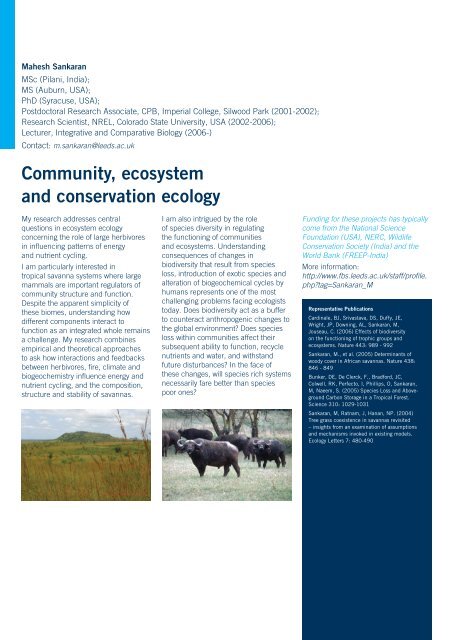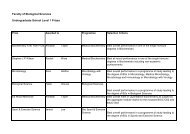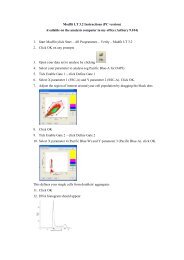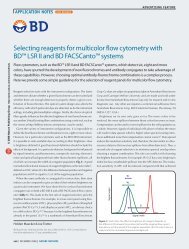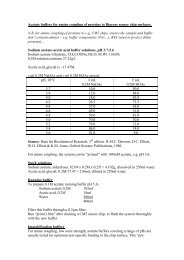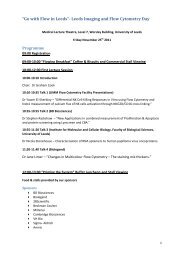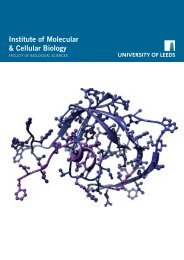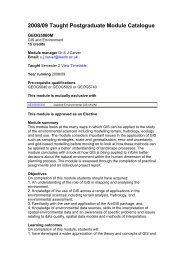3649-08 IICB.indd - Faculty of Biological Sciences - University of ...
3649-08 IICB.indd - Faculty of Biological Sciences - University of ...
3649-08 IICB.indd - Faculty of Biological Sciences - University of ...
Create successful ePaper yourself
Turn your PDF publications into a flip-book with our unique Google optimized e-Paper software.
Mahesh Sankaran<br />
MSc (Pilani, India);<br />
MS (Auburn, USA);<br />
PhD (Syracuse, USA);<br />
Postdoctoral Research Associate, CPB, Imperial College, Silwood Park (2001-2002);<br />
Research Scientist, NREL, Colorado State <strong>University</strong>, USA (2002-2006);<br />
Lecturer, Integrative and Comparative Biology (2006-)<br />
Contact: m.sankaran@leeds.ac.uk<br />
Community, ecosystem<br />
and conservation ecology<br />
My research addresses central<br />
questions in ecosystem ecology<br />
concerning the role <strong>of</strong> large herbivores<br />
in influencing patterns <strong>of</strong> energy<br />
and nutrient cycling.<br />
I am particularly interested in<br />
tropical savanna systems where large<br />
mammals are important regulators <strong>of</strong><br />
community structure and function.<br />
Despite the apparent simplicity <strong>of</strong><br />
these biomes, understanding how<br />
different components interact to<br />
function as an integrated whole remains<br />
a challenge. My research combines<br />
empirical and theoretical approaches<br />
to ask how interactions and feedbacks<br />
between herbivores, fire, climate and<br />
biogeochemistry influence energy and<br />
nutrient cycling, and the composition,<br />
structure and stability <strong>of</strong> savannas.<br />
I am also intrigued by the role<br />
<strong>of</strong> species diversity in regulating<br />
the functioning <strong>of</strong> communities<br />
and ecosystems. Understanding<br />
consequences <strong>of</strong> changes in<br />
biodiversity that result from species<br />
loss, introduction <strong>of</strong> exotic species and<br />
alteration <strong>of</strong> biogeochemical cycles by<br />
humans represents one <strong>of</strong> the most<br />
challenging problems facing ecologists<br />
today. Does biodiversity act as a buffer<br />
to counteract anthropogenic changes to<br />
the global environment? Does species<br />
loss within communities affect their<br />
subsequent ability to function, recycle<br />
nutrients and water, and withstand<br />
future disturbances? In the face <strong>of</strong><br />
these changes, will species rich systems<br />
necessarily fare better than species<br />
poor ones?<br />
Funding for these projects has typically<br />
come from the National Science<br />
Foundation (USA), NERC, Wildlife<br />
Conservation Society (India) and the<br />
World Bank (FREEP-India)<br />
More information:<br />
http://www.fbs.leeds.ac.uk/staff/pr<strong>of</strong>ile.<br />
php?tag=Sankaran_M<br />
Representative Publications<br />
Cardinale, BJ, Srivastava, DS, Duffy, JE,<br />
Wright, JP, Downing, AL, Sankaran, M,<br />
Jouseau, C. (2006) Effects <strong>of</strong> biodiversity<br />
on the functioning <strong>of</strong> trophic groups and<br />
ecosystems. Nature 443: 989 - 992<br />
Sankaran, M., et al. (2005) Determinants <strong>of</strong><br />
woody cover in African savannas. Nature 438:<br />
846 - 849<br />
Bunker, DE, De Clerck, F., Bradford, JC,<br />
Colwell, RK, Perfecto, I, Phillips, O, Sankaran,<br />
M, Naeem, S. (2005) Species Loss and Aboveground<br />
Carbon Storage in a Tropical Forest.<br />
Science 310: 1029-1031<br />
Sankaran, M, Ratnam, J, Hanan, NP. (2004)<br />
Tree grass coexistence in savannas revisited<br />
– insights from an examination <strong>of</strong> assumptions<br />
and mechanisms invoked in existing models.<br />
Ecology Letters 7: 480-490


